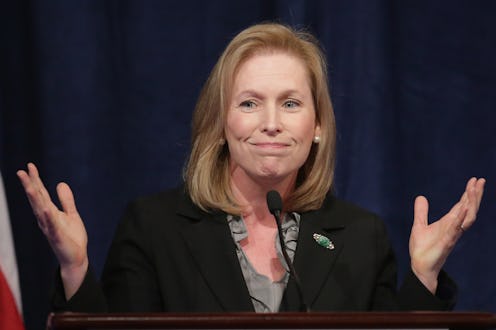News
Gillibrand Has A Message For Congress About UVA
To all those lawmakers looking to use Rolling Stone’s problematic reporting on the UVA gang rape story to mobilize against a proposed bill addressing sexual assault on college campus, Sen. Kirsten Gillibrand (D-NY) has a message for you: Not so fast. Speaking before a Senate subcommittee Tuesday, Gillibrand stressed that the controversial reporting and fact-checking of one girl’s allegations of gang rape at a fraternity house does not mean that universities don’t have a widespread problem with sexual assault (they do) or that victims that come forward are lying about what happened to them (the vast, vast majority are not, and there's no evidence "Jackie" was either).
Instead, the Democratic senator from New York — who has made a name for herself for pushing to combat sexual assault in the military — pushed for the committee to adopt the Campus Accountability and Safety Act she and Sen. Clare McCaskill (D-Mo.) are sponsoring.
I hope this story will not ultimately outshine the story of thousands of brave women and men telling their stories and holding their colleges and universities across the country accountable.
The proposed bill’s mission is two-fold: First, to bolster support for survivors of sexual assault on college campuses by providing federal funds, and second, to increase accountability within the institutions themselves for how they report sexual assault cases by threatening noncompliant universities with increased penalties. Of the 440 four-year institutions examined, McCaskill’s office found that 41 percent had not opened up a sexual assault investigation within the past five years. Gillibrand and McCaskill introduced the legislation back in June.
At first, the appearance of an in-depth feature on the gang rape of "Jackie” at a UVA fraternity house during her first year — and the ensuing lack of concern or intervention from campus administrators — seemed the perfect example of why Gillibrand’s bill was needed. The story captured national attention (and headlines), prompting UVA President Teresa Sullivan to ban all fraternity activity through the rest of 2014.
But only a few days after reporter Sabrina Rubin Erdely’s piece went public, reporters from a number of outlets began to question the validity of her reporting and to poke holes in Jackie’s story. The accused fraternity also got involved in its own defense, pointing out that the UVA chapter had not hosted any social events on the night Jackie claimed to have been raped at the house. It didn’t help that Erdely had not seriously attempted to contact the boy who Jackie identified as the engineer of the whole episode or to interview the friends that Jackie ran into after the rape allegedly took place.
As the story continued to unravel across blogs and social media feeds, Rolling Stone published a statement backing away from the reporting. The magazine’s trust in Jackie’s story, Managing Editor Will Dana claimed in the original version published, had been “misplaced.” (The statement has since been amended to place the blame on Rolling Stone, not Jackie.)
Jackie’s friends remain convinced that she told Erdely the truth. Regardless, the shoddy fact-checking on the part of Rolling Stone's reporter and editorial team adds just more fuel to the fire for conservative politicians or commentators who worry more about "the girl who cried rape" than they do about the documented problem of sexual assault.
Alex Pinkleton, a friend of Jackie’s at UVA who herself has survived rape, told The Washington Post that she worried people would use Jackie’s case as a rationale for not believing other rape survivors going forward.
We need to remember that the majority of survivors who are coming forward are telling the truth. While the details of this one case may have been misreported, this does not erase the somber truth this article brought to light: rape is far more prevalent than we realize, and it is often misunderstood and mishandled by peers, institutions, and society at large.
As Pinkleton noted, the prominence of Jackie’s story has now been superseded by the prominence of its subsequent denial — a PR fiasco for those advocates like Gillibrand trying to secure more federal resources for and attention to sexual assault on college campuses.
In her testimony, Gillibrand stressed that this one instance of purported sexual assault does not mean that UVA and other universities do not face real problems when it comes to handling rape victims.
These facts have not changed: UVA has admitted they have allowed students who have confessed to sexually assaulting another student to remain on campus. That is and remains shocking. It is painfully clear that colleges across the country have a real problem with how they are handling, or not handling cases of sexual assault on their campuses.
Rolling Stone appears to be engaged in the process of re-reporting its investigation into Jackie’s rape allegations. It is impossible to predict what will come of the magazine’s second attempt.
Regardless of how the reporting ultimately settles out, Gillibrand has a few words for any colleagues out there who might not be sympathetic to her cause:
I refuse to let this story to become an excuse for Congress to do nothing and accept a broken system.
Images: Getty Images (3)
